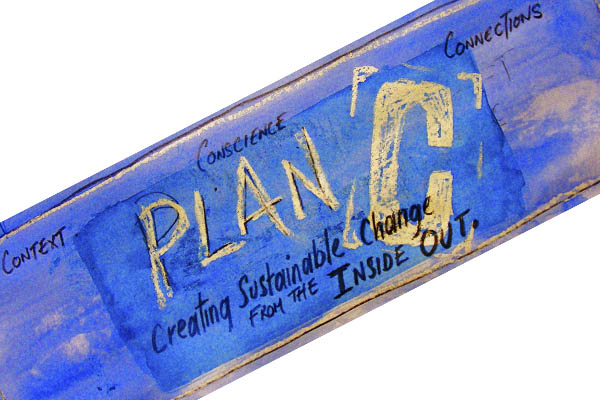Let’s Talk About Failure

“I tell clients we can beat climate change, I don’t say we might fail”, says a leading sustainability adviser. “It’s like coaching a football team going up against strong competition, you tell them they can win. You don’t tell them the opposition’s tough and they’re likely to be thrashed.”
Variations on this analogy dominate discussion of climate change – especially communications to build public support for a strong and binding deal in Cancún in Mexico in November: “We’ve got to win, if we all try hard enough we will win…”; “Don’t mention failure, no one will be inspired and we’ll fail…”
As Football World Cup fever grows, flags are waiving and the chants of “win, win, win” are getting louder. But lose at football and you can play again. Lose at the climate challenge and climate related disasters affect hundreds of millions of people; economic impacts could be hundreds of billions of dollars and sea level rises could affect 1 in 10 of the world’s population. And there’s no rematch.
‘Got-to-win’ is simply the wrong approach to communicate about situations where the possibility of failure is real, the impact of doing so significant and the opportunity for recovery limited.
We need honesty about the possibility of failure. Unless failure is an option, you can’t make contingency plans. Without realistic contingency plans in development we lose valuable time if things do go wrong.
This notion of failure raised its head recently in the lengthy debate between George Monbiot of the Guardian newspaper, Paul Kingsnorth of the newly established Dark Mountain Project and a multitude of readers. The debate itself began with Monbiot’s question of whether Dark Mountain Project’s call to withdraw from the fight against climate change and instead concentrate on building a culture that was strong enough to withstand the inevitable changes was an effective way to go. Monbiot thought not and suggested that a ‘sit back and wait’ approach simply conspired in “the destruction of everything greens are supposed to value”. Readers’ comments became more aggressive and focused on ‘got-to-win’ as confusion between a political movement and a cultural one became more entrenched.
Plan C’s Pat Thomas weighed-in briefly with a question about ‘failure’. She wrote: “Although superficially positioned as a response to the world out there, Dark Mountain seems to me to be more of a projection of an inner struggle that a many of us are currently facing. If what we have devoted our lives to, and what we know, has no real influence, if what we try to do isn’t working, or not working fast enough, if we have failed to communicate effectively, have we failed and, more significantly, are we failures?”
The question was ignored in a show-down between George and Paul that was just so… male. Even more of the same intellectual, techno-scientific, oppositional thinking that has created the mess in the first place.
At Footprint, our feeling is that the Dark Mountain Project challenges something fundamental and shadowy in environmentalism and in the wider world: the myth of control – and by association, of doing, of winning at all costs. It’s fascinating to see the environmental movement struggle with this myth – when control is a feature of the very system most of them are trying to oppose!
The challenge is to integrate into our lives our increasing clarity about not being in control. But this needs to be done in a healthy way rather than a nihilistic one.
The qualities of relationship that are healthy are always the same, whether they refer to our relationships with ourselves, other people or the rest of nature. Trust, empathy, compassion, humility, acceptance of a power greater than the individual – apply these to any relationship and healing will emerge.
In this respect, the idea of palliative care for our species is powerful and helpful. The obvious conclusions about death are easy to draw. But the truth is that palliative care – because of the emphasis on Being (the relational qualities) rather than doing – can lead, counter-intuitively perhaps, to healing. This is not uncommon. This healing arises from authentic acknowledgement and acceptance of death itself.
Acceptance is the starting point to healing, not the point of resignation to the apparently inevitable.
It’s not that we should ‘do nothing’, nor should we enter some manic cycle of eco-anorexia where we all starve our souls in the process of trying to save all that we perceive as external (the planet). Like the Dark Mountain Project, we need to be honest about the likely outcomes of our current path (which we show no signs of stepping off) and start the hard work of accepting and then integrating this realism into our lives.
The delightful irony is that this integration is likely to be congruent with living more lightly. It is not congruent with ‘doing nothing’ which requires the same type of denial as ‘doing until you drop’.
In the mean time the debate around the Dark Mountain Project will either continue to polarise until it ossifies and gets totally stuck, or acceptance will dawn and, after a period of anger, sorrow and despair – a process of grieving – the healing can begin.
Perhaps this grieving is what we are witnessing now. Let’s hope so.
David Key and Osbert Lancaster are directrors of Footprint Consulting, the mission of which is to promote ecological sustainability and social justice through personal and organisational development.
Originally posted at Plan C.
© Pat Thomas, David Key, Osbert Lancaster 2010. No reproduction without the authors’ permission.












